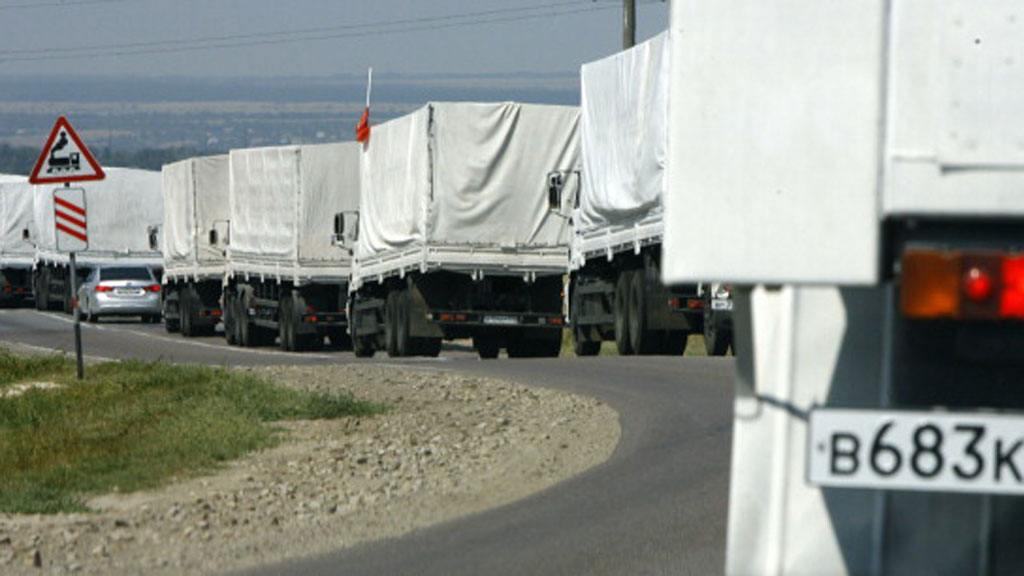Russian aid convoy moves closer to Ukrainian border
Russias humanitarian aid convoy moved closer to the Ukrainian border, as fighting continued in the separatist-held city of Donetsk.

The Kiev government, along with NATO, say the convoy cannot enter Ukraine until the authorities have cleared the cargo. Russia says the convoy is carrying 2,000 tonnes of water, baby food and other humanitarian aid.
Around 280 trucks left the Moscow region on Tuesday to deliver aid to the Luhansk region in eastern Ukraine. Moscow dismissed suggestions it is using the convoy as cover for invasion, as ‘absurd’.
On Thursday the convoy no longer appeared to be heading for the border near Ukraine’s Kharkiv region, as had first been assumed.
If the trucks head for one of the many parts of the border under rebel control on the Ukrainian side, checks by Ukrainian border authorities would prove difficult, if not impossible. But Kiev insists such checks must take place, regardless of where the convoy enters Ukraine.
“If decisions are taken to bring the humanitarian aid in through areas of the border which are temporarily under the control of the terrorists, the cargo will all the same have to be looked at by Ukrainian border guards and transferred to representatives of the Red Cross,” said military spokesman Andriy Lysenko.
The Russian Foreign Ministry said Foreign Minister Sergei Lavrov and his Ukrainian counterpart Pavlo Klimkin spoke over the telephone on Thursday afternoon. Their conversation was part of “continuing intense contacts” involving Russia, Ukraine and the International Committee of the Red Cross.
“They discussed the practical aspects of the swift realisation of an initiative to provide humanitarian assistance to the population of southeast Ukraine,” the ministry said.
Journalists following the convoy say most of the trucks seem to be military vehicles painted white or covered in a tarpaulin. There have also been reports of military equipment following the humanitarian trucks.
So two of these babies just pulled up behind the convoy line pic.twitter.com/EVyACn40HQ
— Courtney Weaver (@courtneymoscow) August 14, 2014
Most of the trucks seem to be green Rus military trucks w/ either white paint job or white tarps over them pic.twitter.com/92MeuvWVse
— Courtney Weaver (@courtneymoscow) August 14, 2014
Relief agencies say people living in Luhansk and in Donetsk, the region’s main industrial hub, are facing shortages of water, food and electricity after four-months of conflict in which the United Nations say more than 2,000 people have been killed.
The pro-Western Kiev government says Russia is partly to blame for the humanitarian crisis. Moscow denies claims – also voiced by the West – of arming the rebels with tanks, missiles and other heavy military equipment.
Meanwhile, fighting continues in Donetsk, where artillery shells hit close to the city centre, killing at least one person,
Two shells landed 200 metres from the Park Inn Radisson, one of the city’s main hotels, shattering windows. The blasts opened up a yawning hole on the third floor of an apartment block and left a broad crater on the pavement.
It was not immediately clear if the artillery was fired by government or rebel forces.
Putin in Crimea
On a visit to Crimea, Russian President Vladimir Putin delivered a speech to ministers and members of the Crimean parliament. He said Russia would stand up for itself but not at the cost of confrontation with the outside world.
The Ukrainian region of Crimea was annexed by Russia earlier this year, a move condemned by Kiev and other Western governments. President Putin said Russia would do everything in its power to end the conflict in Ukraine as soon as possible and stop the bloodshed there.
“We must calmly, with dignity and effectively, build up our country, not fence it off from the outside world,” Putin added. “We need to consolidate and mobilize but not for war or any kind of confrontation … for hard work in the name of Russia.”
-
Latest news
-
As India goes to the polls in the world’s largest election – what do British-Indians think?6m

-
Tees Valley: Meet the candidates in one of the biggest contests coming up in May’s local elections4m

-
Keir Starmer says public sector reform will be a struggle7m

-
Nicola Sturgeon’s husband Peter Murrell charged with embezzlement of funds from SNP1m

-
Ukraine might finally get $60billion in American weapons and assistance to defend against Russia3m

-




